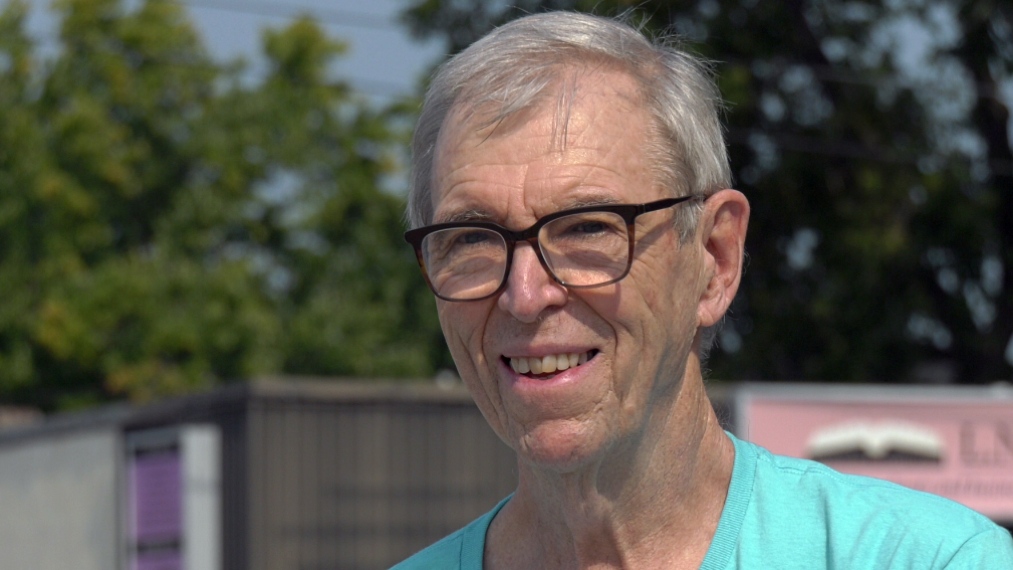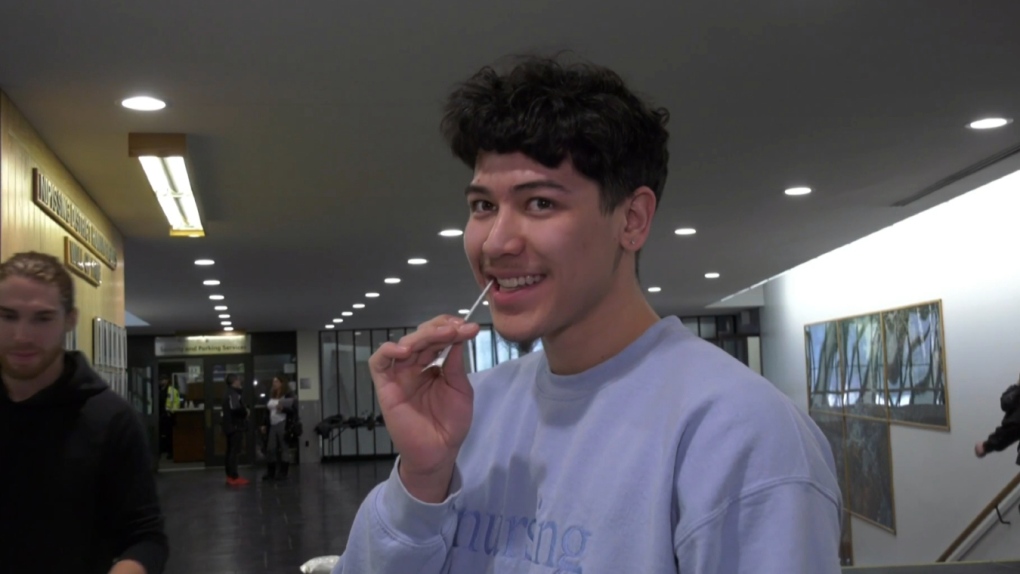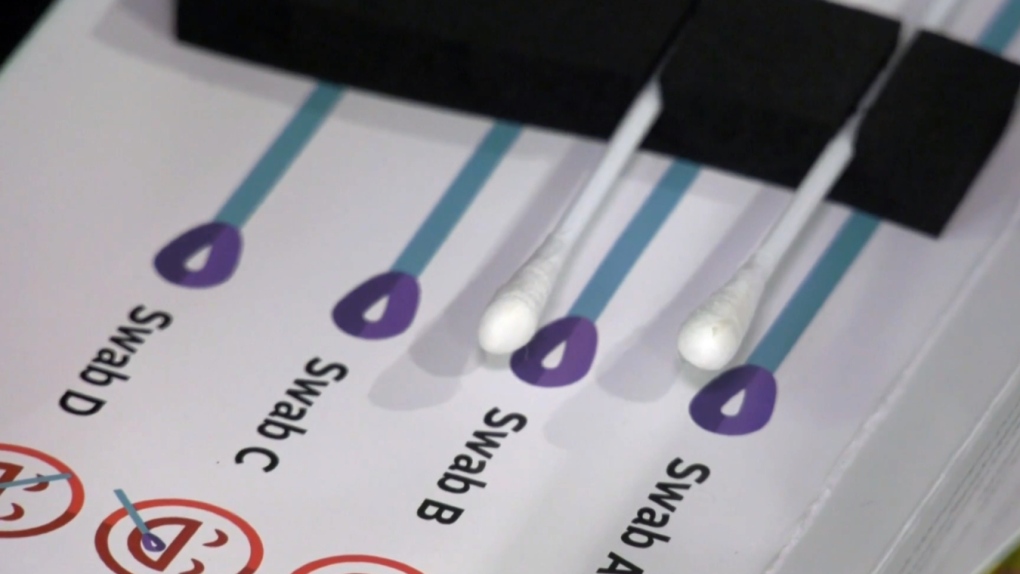Blood cancer survivor helps organize second annual North Bay stem cell swab clinic
Colin Vickers knows first-hand that a 10-minute cheek swab could save someone’s life.
 Colin Vickers is a blood cancer survivor from North Bay, Ont. Vickers had two kinds of blood cancer which turned into acute myeloid leukemia, a type of cancer in which the bone marrow makes a large amount of abnormal blood cells. (Eric Taschner/CTV News Northern Ontairo)
Colin Vickers is a blood cancer survivor from North Bay, Ont. Vickers had two kinds of blood cancer which turned into acute myeloid leukemia, a type of cancer in which the bone marrow makes a large amount of abnormal blood cells. (Eric Taschner/CTV News Northern Ontairo)
The blood cancer survivor told CTV News that he is hoping a few hundred people in North Bay will freely give up a few minutes of their time for a quick swab to see if they’re a stem cell match for someone in desperate need of treatment.
“I know of people in this town who have had stem cell transplants,” said Vickers.
“It could be a young child. It could be a woman. It could be a guy is working out in the mines.”
Vickers had two kinds of blood cancer which turned into acute myeloid leukemia, a type of cancer in which the bone marrow makes a large amount of abnormal blood cells.
Having received a stem cell transplant in October 2021 at Health Sciences North in Greater Sudbury, Ont., from a donor in Scotland, he's now cancer-free.
“This expression goes, I got goosebumps. I have them right now,” said Vickers.
“It was really exciting because there really wasn't much hope without that.”
Anyone aged 17-35 can swab their cheeks to get into the Canadian Blood Services’ national database to be a potential donor. Most transplants are achieved using unrelated donors.
 Anyone aged 17-35 can swab their cheeks to get into the Canadian Blood Services’ national database to be a potential donor. A male post-secondary student is shown swabbing his mouth. (Eric Taschner/CTV News Northern Ontairo)
Anyone aged 17-35 can swab their cheeks to get into the Canadian Blood Services’ national database to be a potential donor. A male post-secondary student is shown swabbing his mouth. (Eric Taschner/CTV News Northern Ontairo)
“We're putting the push on to get people in our community,” Vickers said.
There are several kinds of blood cancer and about 80 types of other medical conditions that can be treated with stem cells and unfortunately even when a patient finds a match, half of them turn out to be unavailable to donate.
According to the Canadian Blood Services, there are around 1,200 patients living in Canada who are waiting for a transplant, which is only possible with a match.
“We search the Canadian and the international registry at the same time because chances are someone may find a match in a different country, specifically if their ethnic background from somewhere else,” said Chris van Doorn a community development manager with the Canadian Blood Services.
Four swabs are in the kit to collect DNA samples from all four corners of one’s mouth. The kits are then sent to a lab to be tested.
 Four swabs are in the stem cell test kit to collect DNA samples from all four corners of one’s mouth. (Eric Taschner/CTV News Northern Ontario)
Four swabs are in the stem cell test kit to collect DNA samples from all four corners of one’s mouth. (Eric Taschner/CTV News Northern Ontario)
“We take DNA markers off the swab, six of them, and we put them on the registry. When we're searching for a patient, we try and match those six to the patient,” van Doorn said.
“If a donor matches them, we'll call them and try and match for more.”
Vickers said he hoping to register 300 people at four swabbing clinics at Canadore College and Nipissing University. Along with the Canadian Blood Services, the university and the college, he helped organize a swabbing clinic at both schools last year – where more than 160 people volunteered to have their cheek swabbed.
“It’s all about the more we can help people out at any give time,” said Vickers.
The clinics are scheduled:
- From 10 a.m. to 3 p.m. on Sept. 25 and 26 at Canadore College’s Education Centre Campus on College Drive, outside the bookstore.
- From 5 p.m. to 7 p.m. on Sept. 25 at Nipissing University’s Surtees Athletic Centre, in the foyer.
- From 10 a.m. to 3 p.m. on Sept. 26 at Canadore College’s Commerce Court, outside of the cafeteria.
For general information about stem cell donation or to register in the database, visit the Canadian Blood Services’ website.
CTVNews.ca Top Stories

Driver who entered Canada 'without stopping' at B.C. border crossing arrested: police
A man who illegally blew through the Canada-U.S. border crossing in Surrey, B.C., Sunday morning has been arrested, according to authorities.
Man responsible for New Year's truck attack previously visited New Orleans, Ontario, Egypt: FBI
The man responsible for the truck attack in New Orleans on New Year's Day that killed 14 people visited the city twice before and recorded video of the French Quarter with hands-free glasses, an FBI official said Sunday.
Thousands are without power due to winter storm hitting Newfoundland and Labrador
Massive waves slammed Newfoundland and Labrador's coastline on Sunday, as a powerful winter storm left thousands without power.
Pamela Anderson, Ryan Reynolds among Canadians vying for Golden Globes tonight
Tonight’s Golden Globes will feature a strong Canadian presence, with British Columbia actors Pamela Anderson and Gabriel LaBelle among the first-time nominees.
'It was just devastating': Southern Manitoba golf course clubhouse burns for second time in 4 years
A golf course clubhouse in Morden, Man. went up in flames Sunday for the second time in less than four years, and mere days after its reopening from the previous fire was celebrated.
WATCH Woman critically injured in explosive Ottawa crash caught on camera
Dashcam footage sent to CTV News shows a vehicle travelling at a high rate of speed in the wrong direction before striking and damaging a hydro pole.
Maserati driver critically injures one, seriously injures another in Surrey hit-and-run: police
The driver of a Maserati fled the scene of a high-speed crash in Surrey that sent two people to hospital, one in critical condition on Saturday night, according to authorities.
Motocross rider injured after executing jump during North American International Motorcycle Supershow
Christian Martinez, a motocross rider participating in the North American International Motorcycle Supershow in Mississauga, was rushed to the hospital after executing a big jump during the show, a source tells CP24.
Here’s why you should monitor your blood pressure, keep it in check
An Ottawa pharmacist says blood pressure is a good indicator of overall health, noting the importance of keeping it at healthy rates.
































